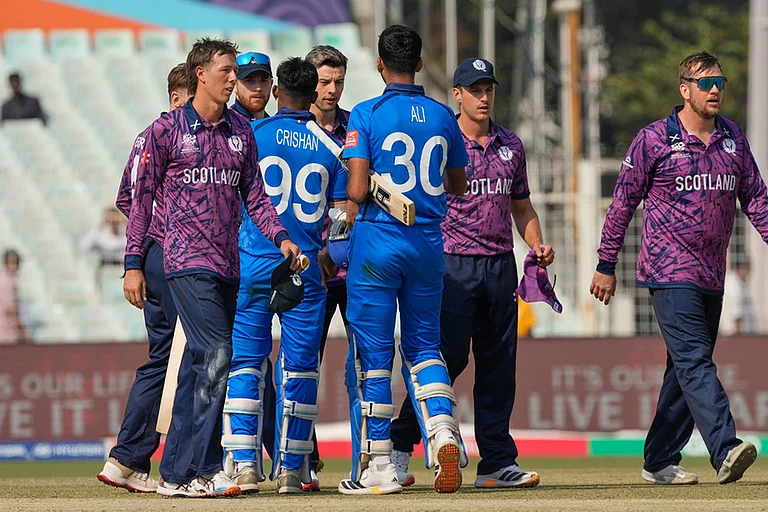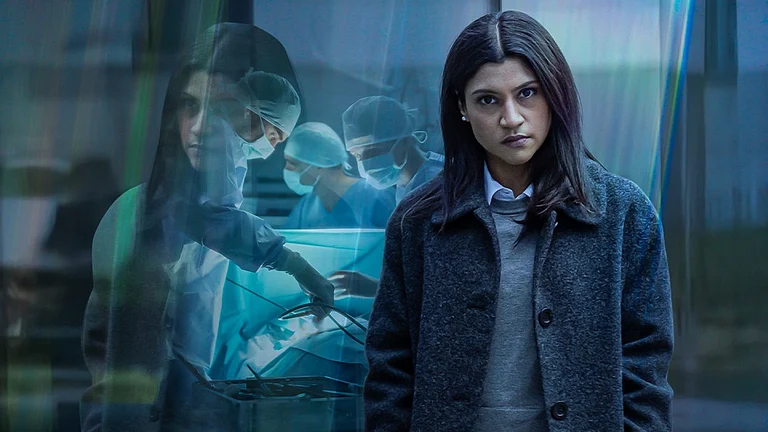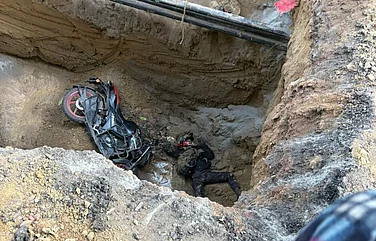Stick For A Selfie
It’s not quite in the league of David Cameron and Barack Obama taking a selfie with then Danish PM Helle Thorning-Schmidt at Nelson Mandela’s funeral, but Amruta Fadnavis, wife of Maharashtra CM Devendra Fadnavis, has caused a bit of a to-do on social media. Aboard India’s first cruise ship Angria for its maiden run, Fadnavis decided to pose for a selfie while sitting on the edge of the deck, past a safety barricade. A video that went viral on social media shows her staying in position despite the pleas of security personnel. After she was criticised for ‘setting a bad example’ she issued an apology, but added that “The spot where I clicked the selfies was not dangerous because there were two more steps below. I want to tell the youth that they should not take excessive risk to take a selfie.”

Purchasing Power Inebriety
There’s no telling what acquisitions you’ll come across when you check your hotel room the morning after—tigers, babies, even the hotel itself. A London-based couple honeymooning in Sri Lanka last year checked into a rustic seaside hotel, and soon became friendly with the staff over a few bottles of rum. Upon being informed that the lease on the hotel was almost up, their addled minds hit upon an ingenious thought. “After finding out that it was £10,000 a year, Mark and I thought it would be brilliant to buy it—because we were so drunk,” said Gina Lyons, 33. Now, a year (and a baby) later, the couple, who live in a ‘tiny’ flat in the UK, are the proud owners of a seven-bedroom B&B called ‘Lucky Beach Tangalle’.

Cop Of The Pops
The police—not the band, sadly, but the Karnataka police—have released a music video about drug abuse and its ill effects. It was put together over the course of three months by a team of 20 constables and head constables from Byappanahalli police station in Bangalore. The team members themselves acted in the video and sang the song, which had music by composer B.R. Hemanth Kumar and lyrics written by constable Subramani Shanubhoganahalli, 35, a writer at the station whose previous hits include the lyrics for a song about chain snatching. He has also sung in a Kannada film. Commissioner T. Suneel Kumar told reporters, “The idea was to make people realise that the city police is not just an enforcing agency. We are also concerned about gullible drug users...our aim is to provide a holistic approach to drug abuse.”

Visceral Drama On Hasina
In what is usually termed as a PPP (public-private partnership), a “documentary-drama” on Bangladeshi Prime Minister Sheikh Hasina’s life is all ready for an October release. It’s the result of a five-year-long collaboration between the country’s Centre for Research and Information and Applebox films’ founder-director Rejaur Rahman Khan Piplu. The filmmaker said that in the documentary he has “scrutinised her noble and complex backstory…tracking back from the ’70s, in the political and historical spectrum of the subcontinent; in a way that has yet not been experienced through visceral film-making.” Hopefully, the government’s involvement in this does not come at the expense of the critical aspects of a state head’s life. But then, has a PPP ever entailed that?

War Memory Treasure
Part of the war game was played in Arunachal Pradesh when China attacked India in 1962. The Indian army had set up base in many villages of the state, building bunkers, barracks, roads and bridges to hold the advancing Chinese. A lot of community land was taken over by the army in West Kameng district. Fifty-six years hence, the government has realised that none of these villagers were given compensation. It has sprung up a most pleasant surprise: a total of Rs 37.73 crore has been distributed among the villagers, who were seen smiling ear to ear, receiving cheques on stage from CM Pema Khandu.
Eye Glass Ceiling
Drawing all eyes to herself, Sayantani Ghosh drew Durga’s eyes twice. Known as Chokkhu Daan in Bengali, drawing the idol’s eyes—a male preserve—is considered highly auspicious—the last step before Durga is ready for worship. Ghosh, a transgender woman and a lawyer, broke the gender barrier twice this year, drawing the eyes of idols at two pujas in Calcutta and Howrah. She said, “It is an enormous change.... Our society is changing for the better. My drawing the eyes of Durga will instil hope in other transgenders.” Ghosh also runs a dance school for transgender people.
Flower For Doomed Youth
In Flanders fields the poppies grow; and so do marigolds. The latter has been enlisted as the symbol of India’s sacrifices—in all wars—ahead of the centenary of the WWI Armistice on November 11. A feeling that a uniquely Indian symbol was needed led to the India Remembers project, a joint venture of the United Service Institution of India and the Commonwealth War Graves Commission, proposing that the marigold join the poppy as a symbol of remembrance. Sqn Ldr (retd) Rana T.S. Chhina, secretary, Centre for Armed Forces Historical Research at the USI, said, “The marigold was chosen because it is easily and widely available, and also because saffron is seen as a colour of sacrifice.”

Do They Have A Dime?
When you walk around, cap in hand, you can hardly afford to take a moral position. What Pakistani Prime Minister Imran Khan is currently doing is a case in point.
Faced with a looming economic crisis, Imran is knocking on every friendly nation’s door for financial help to revive the country’s economy, especially from rich, oil-producing countries like Saudi Arabia. The Saudi monarch, King Salman, has personally invited a number of heads of government, including Imran, for a high-profile conference in Riyadh being dubbed as ‘Davos in the Desert’.
But the conference is being held in the backdrop of the controversial death of Saudi dissident Jamal Khashoggi INSide the Saudi consulate in Istanbul. A number of countries have already announced their decision to boycott and stay away from the conference. But Imran can ill–afford to join their ranks. Imran, who had vowed not to undertake any foreign trip within the first six months of assuming charge, had to renege on it when he visited Saudi Arabia in September. The Saudis are one of the biggest backers of Pakistan. They stood by Pakistan during past crises and have also mediated in internal political differences in Pakistan.
However, relations between the two sides had strained a little when Islamabad refused to send troops to aid the Saudi-led Gulf coalition forces in the war in Yemen against Iranian proxies. Caught in a bind over this fight between the two big Islamic countries, Pakistan decided to steer clear of courting any fresh controversy. Though Tehran had appreciated the gesture, the leadership in Riyadh had taken affront.
However, Imran’s arrival in Pakistan had given both sides an opportunity to sort out their differences and put bilateral ties back on track. The fact Imran chose Saudi Arabia as the first country for his foreign visit on becoming prime minister was a clear signal of the importance attached to the country in the Pakistani scheme of things.
With the prospect of Saudi leaders making significant investments in Pakistan and helping it tide over the economic crisis, along with other friendly investors who will be attending the Riyadh conference, there was no way Imran can stay away from this high-profile meet. However, he does not want his move to become too obvious. Therefore, he has tried to couch the move by also visiting two other countries, Malaysia and China. This, he hopes, will take away some of the criticism for bowing so low before the Saudis, who are in the eye of a global storm over Khashoggi’s brutal murder.
Illustrations by Saahil


























